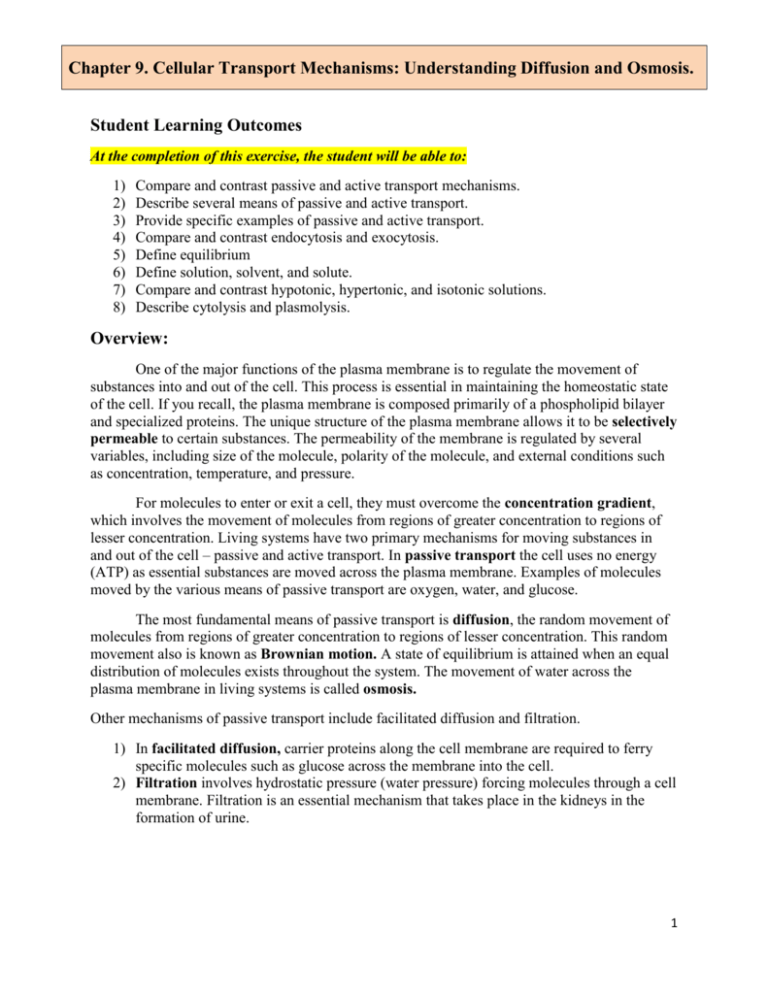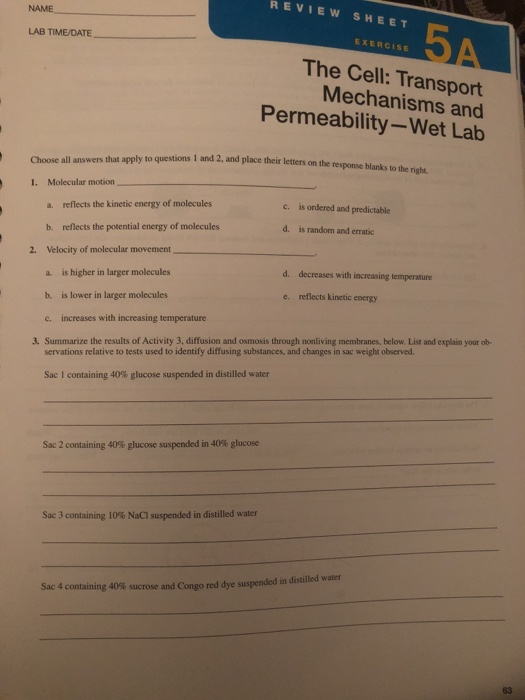
Isotonic solutions 290-300 mosm 09 saline no net diffusion of water. If a hypertonic and hypotonic solution was separated by a selectively permeable membrane you would predict that net water flow would be in which direction.

Solubility in the lipid portion of the membrane andor presence of membrane carriers for the substance s.
Lab exercise 5 transport through cell membranes. Cells take on water by osmosis and swell possibly to the point of bursting filtration. Passive process by which water and solutes are forced through a membrane by hydrostatic fluid pressure. Amount of filtrate formed depends on.
Pressure gradient and the size of the membrane pores. Start studying Exercise 5- Transport Across the Plasma Membrane. Learn vocabulary terms and more with flashcards games and other study tools.
View Lab Report - Lab Exercise 5 Transport Across the Plasma Membrane from BIOS 251 at Chamberlain College of Nursing. N-ansEort Across the Plasma. LAB 5 Cell Membranes and Transport Eukaryotic cellular membranes are fluid mosaics of lipids and proteins Membrane structure results in selective permeability Transport.
Passive simple diffusion facilitated diffusion osmosis Active ATP-driven eg. Na -K pump Bulk endocytosis and exocytosis. 134 Review Sheet 5A Diffusion of solutes through a semipermeable membrane.
Passage of substances across a membrane from an area of higher hydrostatic pressure to an area of lower hydrostatic pressure. A transport system that requires that the cell provide ATP. Cell membranes control what goes in and out the cell it protects it.
The lipid bilayer describes the membrane of both animal and plant cells where the properties that make up phospholipids are very important to the cell membrane function it has protein which is dispersed properly and it mainly functions in the selective transport of molecules. Transport molecules into a virtual cell Next you will teleport to a virtual cell where you will explore how different types of molecules can cross the cell membrane. While some molecules are able to diffuse across the cell membrane most molecules require a transporter protein to enter or leave the cell.
Cell Membrane Structure and Transport Name. Purpose of this exercise. Define solute solvent solution and selectively permeable.
Compare and contrast diffusion and osmosis. How are they alike. How are they different.
If a hypertonic and hypotonic solution was separated by a selectively permeable membrane you would predict that net water flow would be in which direction. Transport of materials across cell membranes and plant cell water relations report WAB2 121 Lab. Conclusion Osmosis is the diffusion of water through a semi-permeable membrane and this can be observed using different epidermal cells with pigments Cells in hypotonic solutions become turgid and cells in hypertonic solutions become plasmolyzed.
Soak 6 cut lengths of dialysis tubing in a small beaker of distilled water for 2-3 minutes. If the cut tubing has been placed in a small beaker on your tray just pour enough distilled water into the beaker to cover the tubing 2. Label five 250 ml beakers 1-5 with labeling tape.
Cell Transport And Permeability Essay. When a cell experiences a difference in concentration also known as concentration gradient molecules are evenly distributed throughout the environment in. The First And Second Laws Of Thermodynamics.
Both exocytosis and endocytosis use vesicles to transport substances and they both require energy. Endocytosis is a form of transport that allows a cell. REVIEW SHEET -KEY EXERCISE 1 Cell Transport Mechanisms and Permeability.
Put the following in order from smallest to largest molecular weight. Glucose sodium chloride albumin and ureaa. Sodium chloride urea glucose albumin.
In Da Club - Membranes Transport. Crash Course Biology 5 - YouTube. This lab exercise is designed to familiarize the student with the principles of osmosis and diffusion.
At the end of this exercise the student should be able to. Define osmosis and diffusion. Osmosis through the Cell Membrane of an Egg Introduction.
Transport can be either passive or active. Passive transport is the movement of substances across the membrane without any input of energy by the cell. Active transport is the movement of materials where a cell is required to expend energy.
Continue reading Egg Osmosis Sample 2 lab. Solubility in the lipid portion of the membrane andor presence of membrane carriers for the substance s. A semipermeable sac containing 4 NaCl 9 glucose and 10 albumin is suspended in a solution with the following com- position.
10 NaCl 10 glucose and 40 albumin. EXERCISE 4 REVIEW SHEET Cell Membrane Transport Mechanisms Name Lab TimeDate Choose all answers that apply to tome 1 and 2 and place their letters on the response blanks 1. The motion of molecules a reflects the kinetle energy of molecules cis ordered and predictable b.
Reflects the potential energy of molecules dis random and ratio 2. EXERCISE 5 TRANSPORT ACROSS THE PLASMA MEMBRANE43 B. Diffusion and Osmosis Across a Dialysis Membrane Osmosis is the diffusion of a solvent dissolving medium which is water in living organisms across a selectively per- meable membrane that occurs in response to differences in solutesubstance dissolved in solvent concentrations.
Lab Manual Ch 5 Ex 5-2 - Osmosis and Volume Changes in Cells and Ex 5-3 - Rate of Osmosis Osmosis - diffusion of water through a semipermeable membrane. The movement of water across cell membranes can affect cell volume shape and cell survival. Isotonic solutions 290-300 mosm 09 saline no net diffusion of water.